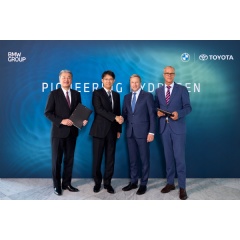Toyota and BMW Collaborating for a Hydrogen-Powered Future
Key Ideas
- Toyota and BMW are jointly developing a third-generation fuel cell system to expand the lineup of fuel cell passenger cars, aiming to offer customers a wider range of fuel cell electric vehicles (FCEV).
- Both companies are working on improving infrastructure for hydrogen, with BMW planning to launch its first mass-produced FCEV in 2028.
- By collaborating in development, procurement, and amalgamating powertrain units, Toyota and BMW aim to drive down costs and make FCEVs more accessible to contribute to the creation of a hydrogen society.
- Toyota's commitment to hydrogen as a key energy source aligns with its efforts towards achieving carbon neutrality, focusing on a multi-pathway approach that includes FCEV, BEV, HEV, and PHEV options to reduce CO2 emissions.
Toyota Motor Corporation and the BMW Group have signed an agreement to enhance their collaboration in the hydrogen sector, with the goal of creating a hydrogen society and achieving overall carbon neutrality. The two automotive giants are jointly developing a third-generation fuel cell system to equip more passenger cars with fuel cell technology, providing customers with a broader range of fuel cell electric vehicles (FCEV). BMW is set to introduce its first mass-produced FCEV in 2028 as part of this partnership. Toyota and BMW are also focusing on infrastructure development to support the uptake of hydrogen-powered vehicles, aiming to establish sustainable hydrogen supply networks by working closely with hydrogen-producing companies and distribution facilities.
The collaboration between Toyota and BMW aims to drive innovation in fuel cell systems by sharing a common vision of realizing a hydrogen society. By collaborating on the development and procurement of fuel cell systems, the companies intend to make FCEVs more affordable and accessible to contribute to the transition to a hydrogen-based economy. Both companies emphasize the importance of strategic partnerships and aim to create clusters of hydrogen demand to ensure a stable hydrogen supply and reduce costs.
Toyota's strategic focus on hydrogen aligns with its commitment to achieving carbon neutrality, with a multi-pathway approach that includes FCEVs alongside other electric vehicle options. The company plans to continue addressing the needs of customers worldwide by offering a diverse range of electrified powertrains, including fuel cell technology. The collaboration between Toyota and BMW signifies a significant step towards a future where hydrogen energy plays a pivotal role in sustainable mobility and environmental conservation.
Topics
Europe
Automotive Industry
Fuel Cell Technology
Environmental Sustainability
Collaboration
Infrastructure Development
Carbon Neutrality
Technological Innovation
Latest News
